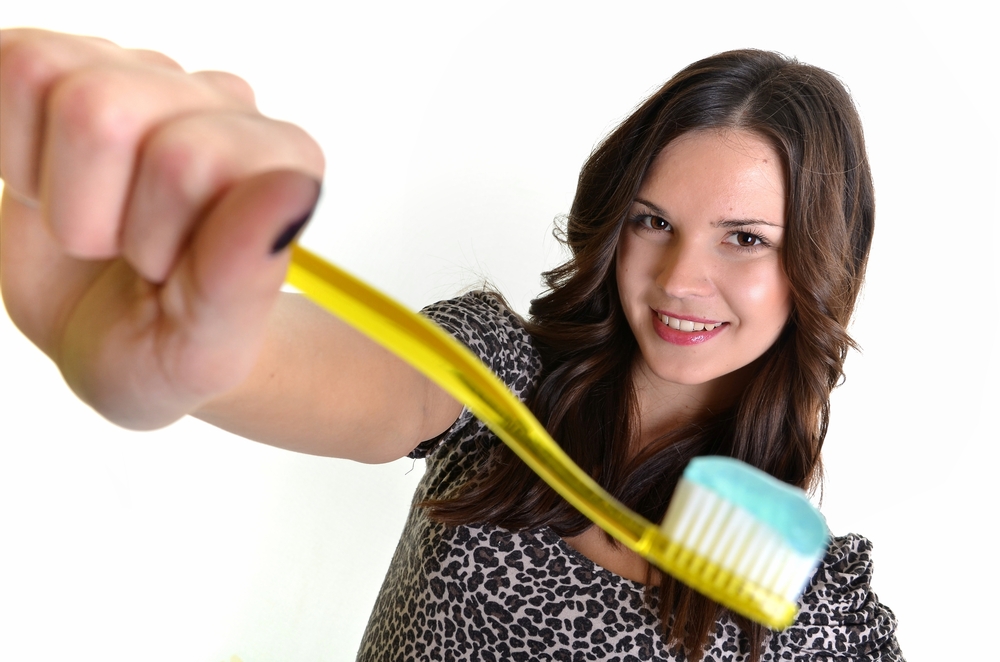Send your question to Umbra!
Q. I am trying to reduce waste (like any diligent Grist reader), and one item I can’t find in a recyclable or reusable container is toothpaste. Are there any toothpastes that come in recyclable containers and aren’t made by big companies and full of chemicals? I’ve considered making my own paste from baking soda, but then there’s no fluoride. How important is that?
Rachelle G.
Menlo Park, Calif.
A. Dearest Rachelle,
We’ve come a long way since the days of cleaning our choppers with crushed twigs and bones, but that doesn’t mean we’ve figured out everything when it comes to eco-oral hygiene. Your question addresses two issues, Rachelle: the toothpaste itself, and the tube it comes in. Let’s brush up on the former first. Environmentally and healthfully speaking, what’s the best way to keep our teeth clean?
The medical establishment is pretty much unanimous on this one: You want to brush your teeth at least twice daily with an American Dental Association-approved toothpaste. The ADA conducts gold-standard testing to ensure a given goop actually follows up on its claims to protect those pearly whites — and brands that pass muster get an ADA seal on the package. Easy, right?
Well, not so fast: An ADA seal doesn’t necessarily mean a tube is free of potentially worrisome chemical ingredients. Our old nemesis triclosan pops up in some toothpastes as an antibacterial agent, as do propylene glycol (a humectant, or preservative) and silica (an abrasive). For help navigating this toothy jungle, we can turn to a few old friends. The Environmental Working Group and the Good Guide both maintain searchable toothpaste databases that rank products according to safety and company environmental practices. I’m not in the business of recommending specific brands, but a little cross-referencing among these lists will net you some options that everybody (basically) agrees on.
And then there’s the DIY approach. A quick Google search will unearth a slew of homemade toothpaste recipes, usually based on jack-of-all-trades cleaner baking soda. Research has shown that toothpastes that include baking soda remove more plaque than those that don’t. Even Big Toothpaste members Colgate and Crest acknowledge the stuff removes surface stains on its own. (And don’t forget that it comes in a recyclable cardboard box.) But it lacks ADA approval, and as you rightly point out, it doesn’t contain fluoride.
I may occasionally dress up as the Tooth Fairy for community theater shows, Rachelle, but I’m no dentist. With the to-fluoride-or-not-to-fluoride question, you’re better off in the capable hands of your own tooth-care professional. I’ll just say that while your drinking water likely contains fluoride already, toothpaste that includes it is the party line on dental hygiene from the ADA, the Academy of General Dentistry, the Centers for Disease Control and Prevention, and lots of dentists.
And now let’s sink our teeth into the other part of your question: What to do about the container? Good news: You can indeed recycle that tube. If your brand of choice comes in an aluminum or #4 plastic squeezer, your local recycling center may accept it (check the company’s website for clues as to materials used, and check with your recycler to see if they’ll take it). To prep, squeeze out as much paste as possible, then cut off the top, near the cap. Slit the pouch down the side to open it up. Tadaa! Now you can scrub it clean.
Even if your local collector declines, you can still recycle the tubes through TerraCycle’s Oral Care Brigade. The organization accepts all brands of toothpaste tubes, plus toothbrushes, caps, and floss containers, through its mail-in program (it even supplies prepaid shipping labels). You’ll need to send a minimum of six pounds at a time, so why not spread the word and set up a collection bin at school or work? Clean teeth, plus a community’s worth of diverted waste — now there’s something to smile about.
Dentifricially,
Umbra




